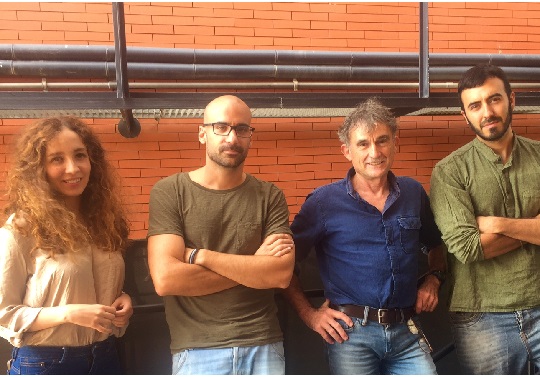They plan to study whether the physiological cost of sexual frustration can accelerate evolution
- Scientific Culture and Innovation Unit
- October 11st, 2017

Pau Carazo, Roberto García-Roa, Zahida Sultanova and Manuel Serra, members of a research team at the Cavanilles Institute of the University of Valencia, have raised a possible evolutionary mechanism not considered until now in some species: the feedback of the differences between individuals due to the interaction experiences they have had throughout their lives.
In a letter recently published in the journal Nature Ecology and Evolution, they propose to study the evolutionary consequences of males with a reduced mating rate aging more quickly, due to the physiological costs associated with sexual frustration. The proposal of the Valencian research group is born from an international work published recently where it has been shown that sexual frustration has accelerated aging in the fruit fly (Drosophila melanogaster), between 15 and 20%.
"What we intend with this theoretical note is to draw the attention of the scientific community to what these discoveries could mean in terms of how intense sexual selection is (preferential access to reproduction)", says Pau Carazo, researcher at the Cavanilles Institute of Biodiversity and Evolutionary Biology and first signatory of the letter, who also points out that the costs of sexual frustration "will tend to increase the differences in the reproductive success of different males, which will tend to intensify sexual selection".
"Evolutionary biologists are very interested in determining the intensity of evolution by Darwinian selection. It is crucial to explain how populations achieve an adjustment between their genes and environmental conditions, and how genetic divergence occurs between populations, the initial step for the appearance of new species", points out Manuel Serra, Professor of Ecology at the Faculty of Biological Sciences and also signatory of the letter "Perception costs of reproduction can magnify sexual selection" in the journal Nature Ecology and Evolution.
"When a male of this species detects the presence of a female, physiological mechanisms are set in motion that prepare him to compete against other males and reproduce. If he doesn't manage to pair up, these frustrated expectations cause his life expectancy to be reduced by around 15 to 20%", says Zahida Sultanova, PhD student, researcher and also signatory of the letter. "On a human scale, this would mean a reduction of about 15 years in our life", says Roberto García-Roa, post-doctoral researcher at the Cavanilles Institute. Although at the moment it has been studied in a few species, the physiological mechanisms of this type of aging seem very conserved, which suggests that it could be a very widespread phenomenon among animals, according to the research team.
"There are many evolutionary phenomena that, despite being common or central to living beings, we still do not understand sufficiently. In this context, the potential of sexual selection to understand them is increasingly recognised", explains Pau Carazo. "We have identified that the recently discovered phenomenon of Drosophila melanogaster has the potential to intensify sexual selection. The obvious conclusion is that evolutionists now have to investigate whether the feedback of reproductive failure actually has measurable evolutionary consequences”.
Research team
Pau Carazo is the main researcher of the Behavior and Evolution unit, belonging to the Laboratory of Ethology, to which Zahida Sultanova and Roberto García-Roa also belong. This unit is interested in the evolution and function of behavior, and its role as an engine of evolutionary change. Currently its main line of research is the evolution of sexual conflict and the factors that modulate it (aging, kin selection, or ecology), using the model species Drosophila melanogaster.
Manuel Serra directs the Evolutionary Ecology laboratory, which investigates population and evolutionary ecology using aquatic invertebrates as model organisms. Their current investigations focus on the differential adaptation in populations of the same species to the degree of environmental uncertainty of the places they inhabit. These adaptations involve the adjustment of the life cycle to the alternation of favorable and adverse phases.
Article:
Pau Carazo, Roberto García-Roa, Zahida Sultanova & Manuel Serra «Perception costes of reproduction can magnify sexual selection» Nature Ecology & Evolution. Published online 04 Septemer 2017. DOI: 10.1038/s41559-017-0312-6
Link: http://rdcu.be/vzf9
















